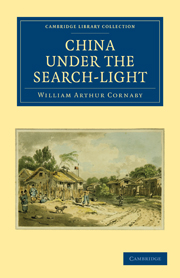Book contents
- Frontmatter
- Contents
- INTRODUCTORY CHAPTER
- CHAPTER II OVER CROWDING
- CHAPTER III SOLIDARITY
- CHAPTER IV HUMANITY IN BUNDLES
- CHAPTER V DEAD-LEVELS
- CHAPTER VI RUTS
- CHAPTER VII THE “NATIVE FOREIGNER”
- CHAPTER VIII SOME ACTORS IN THE TRAGEDY OF 1900
- CHAPTER IX MANDARINDOM
- CHAPTER X THE LAND OF ÆSTHETIC TRADITIONS
- CHAPTER XI THE TRIPLE LANGUAGE OF CHINA
- CHAPTER XII A CHINESE BOOKSTALL
- CHAPTER XIII A DAILY NEWSPAPER
CHAPTER III - SOLIDARITY
Published online by Cambridge University Press: 05 October 2010
- Frontmatter
- Contents
- INTRODUCTORY CHAPTER
- CHAPTER II OVER CROWDING
- CHAPTER III SOLIDARITY
- CHAPTER IV HUMANITY IN BUNDLES
- CHAPTER V DEAD-LEVELS
- CHAPTER VI RUTS
- CHAPTER VII THE “NATIVE FOREIGNER”
- CHAPTER VIII SOME ACTORS IN THE TRAGEDY OF 1900
- CHAPTER IX MANDARINDOM
- CHAPTER X THE LAND OF ÆSTHETIC TRADITIONS
- CHAPTER XI THE TRIPLE LANGUAGE OF CHINA
- CHAPTER XII A CHINESE BOOKSTALL
- CHAPTER XIII A DAILY NEWSPAPER
Summary
The communistic basis of Chinese life seems closely related to the subject of the previous chapter. For let any kind of yielding and cohesive substances be compressed together, and the result will be either one solid lump, or a number of smaller lumps fitting into one another. Which latter is the case among the populations of China.
It is not claimed that the literal compression of overcrowding is in itself alone responsible for the peculiar form of solidarity to be found in China. That phenomenon seems to have been brought about by three kinds of compression. First there has been through the ages a social compression together of larger or smaller communities for common defence. Then there has been the political compression together of family groups by the adoption of the policy advocated by Confucius. And lastly, the literal compression which we have already noted.
Our earliest authentic picture of China is that of a ruling tribe, geographically settled down in the midst of semi-Chinese and more or less aboriginal tribes. This ruling State occupied the north of the present province of Honan, and from its position among semi-dependent States, was naturally called the Middle Realm, a term which afterwards came to be applied to the whole region controlled by that State, hence the modern phrase “Middle Kingdom.”
- Type
- Chapter
- Information
- China Under the Search-Light , pp. 30 - 45Publisher: Cambridge University PressPrint publication year: 2010First published in: 1901



